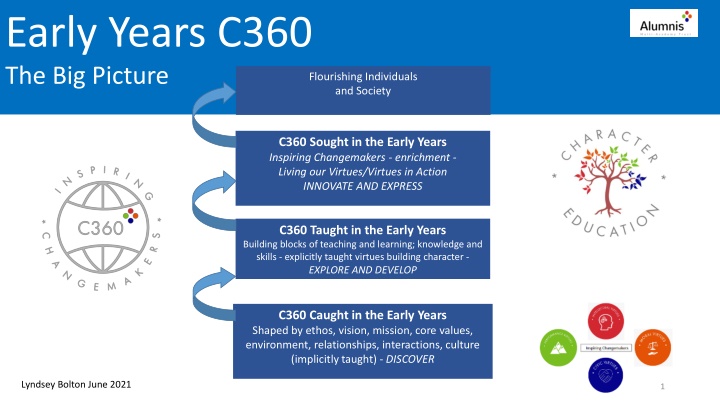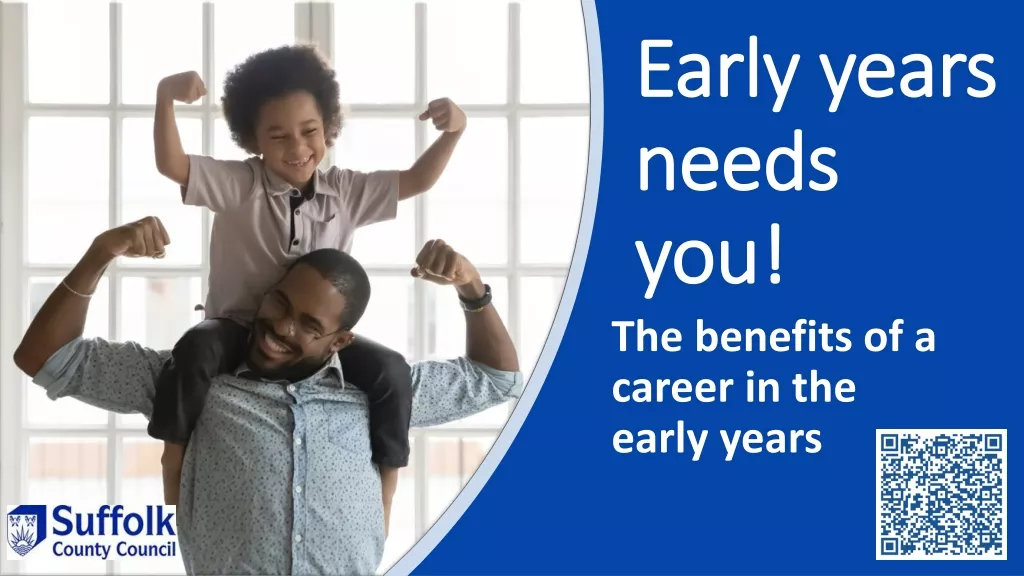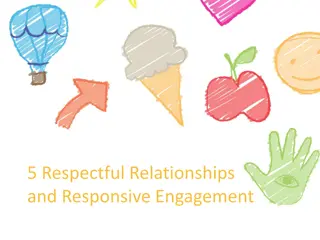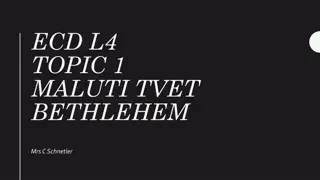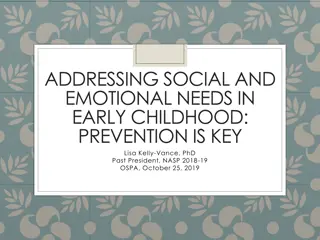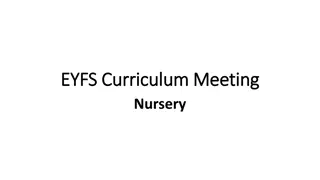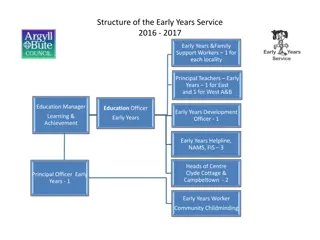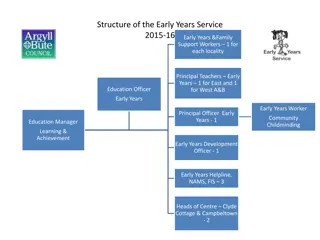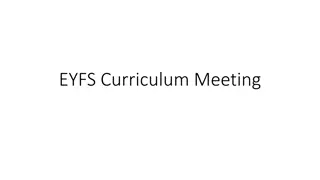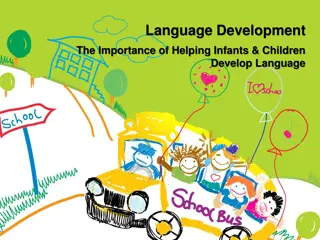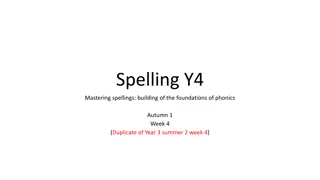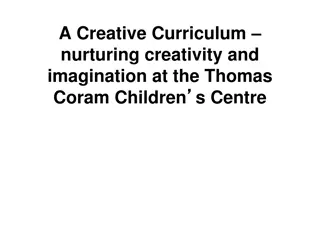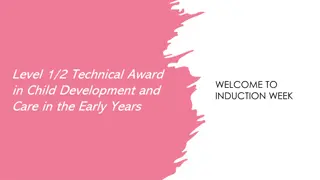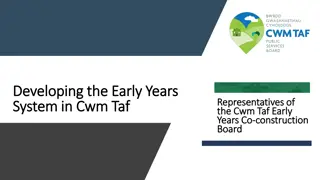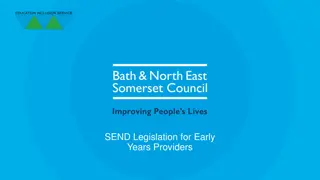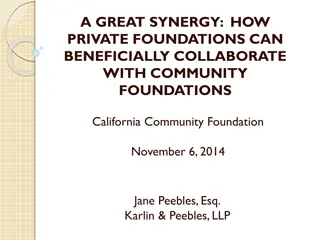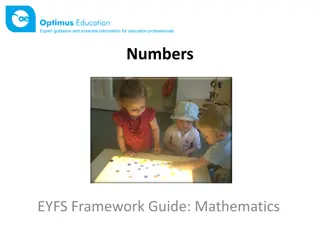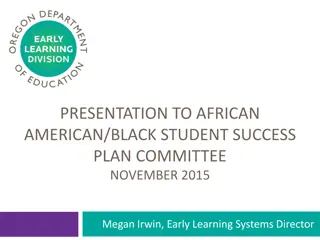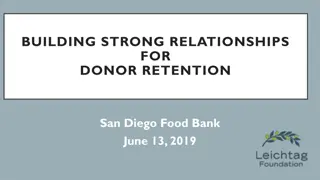Early Years C360 - Building Strong Foundations for Children's Development
Early Years C360 focuses on nurturing the unique qualities of each child, emphasizing positive relationships, enabling environments, and effective teaching methods. The program incorporates statutory frameworks, guiding principles, and cornerstones to support children's holistic growth and development, fostering traits like creativity, critical thinking, and global citizenship.
Download Presentation

Please find below an Image/Link to download the presentation.
The content on the website is provided AS IS for your information and personal use only. It may not be sold, licensed, or shared on other websites without obtaining consent from the author.If you encounter any issues during the download, it is possible that the publisher has removed the file from their server.
You are allowed to download the files provided on this website for personal or commercial use, subject to the condition that they are used lawfully. All files are the property of their respective owners.
The content on the website is provided AS IS for your information and personal use only. It may not be sold, licensed, or shared on other websites without obtaining consent from the author.
E N D
Presentation Transcript
Early Years C360 The Big Picture Flourishing Individuals and Society C360 Sought in the Early Years Inspiring Changemakers - enrichment - Living our Virtues/Virtues in Action INNOVATE AND EXPRESS C360 Taught in the Early Years Building blocks of teaching and learning; knowledge and skills - explicitly taught virtues building character - EXPLORE AND DEVELOP C360 Caught in the Early Years Shaped by ethos, vision, mission, core values, environment, relationships, interactions, culture (implicitly taught) - DISCOVER Lyndsey Bolton June 2021 1 1
Early Years C360 Links to Materials for Guidance Links to Statutory Framework - https://assets.publishing.service.gov.uk/government/uploads/system/uploads/attachment_data/file/974907/EYFS_frame work_-_March_2021.pdf Non Statutory Development Matters - https://assets.publishing.service.gov.uk/government/uploads/system/uploads/attachment_data/file/971620/Development _Matters.pdf Non Statutory Birth to 5 Matters - https://www.birthto5matters.org.uk/ 2 2
Early Years C360 New Statutory EYFS Framework updates Over Arching Principles Every child is a unique child, who is constantly learning and can be resilient, capable, confident and self-assured Children learn to be strong and independent through positive relationships Children learn and develop well in enabling environments with teaching and support from adults, who respond to their individual interests and needs and help them to build their learning over time. Children benefit from a strong partnership between practitioners and parents and/or carers. (See the characteristics of effective teaching and learning at paragraph 1.15) Importance of learning and development. Children develop and learn at different rates. The framework covers the education and care of all children in early years provision, including children with special educational needs and disabilities (SEND). In planning and guiding what children learn, practitioners must reflect on the different rates at which children are developing and adjust their practice appropriately. Three characteristics of effective teaching and learning are: playing and exploring, active learning, creating and thinking critically 3 3
Early Years C360 Cornerstones EXPLORERS AND ACTIVE LEARNERS CREATIVE AND CRITICAL THINKERS RELATIONSHIP BUILDERS GLOBAL CITIZENS 5 5
Early Years C360 Intent Early Years C360 acknowledges that each child is unique, that all children enter our settings bringing with them their own unique characteristics, experiences, ideas, cultural heritages and strengths. . C360 seeks to build on all of these experiences offering children a holistic approach to learning enabling children to explore and make sense of the world around them; the current environment and society in which they live and develop an emerging understanding of their role as a global citizen. EY C360 also recognises that there are three integral elements in ensuring that all children flourish; nurturing and supportive adults, enabling environments and a partnership with parents Early Years C360 is a curriculum that is carefully designed by practitioners who reflect on the different ways that children learn knowledge and skills, shapes and builds children s character strengths and gives opportunities for reflection, critical thinking, problem solving, innovation and importantly encourages growth of positive relationships with others. EY C360 focuses heavily on how children learn as well what they learn i.e. processes as well as outcomes. Underpinning the EY C360 characteristics of effective teaching and learning is the understanding that during their earliest years, children form attitudes about learning that will last a lifetime. Children who learn alongside supportive and reflective practitioners and within a stimulating and inspiring learning environment and receive the right sort of support and encouragement during these years will flourish as curious, creative, resilient and adventurous learners throughout the rest of their lives. The Effective Character of an Early Years Inspiring Changemaker; All children flourish as 6 6 Explorers and Active Learners Critical and Creative Thinkers Relationship Builders Global Citizens
Early Years C360 Character of an Inspiring Changemaker Realises that their actions have an effect on the world Shows curiosity about objects, people and events Brings own fascination s and interests Explorer Plan and think ahead Curiosity Creativity Engages in Experience Investigates Guide own thinking with inner voice Responds to new experience s Confidence Motivation Make choices and explore different resources/ materials Courage Showing a can do independen t attitude Willing to have a go Enjoys taking a risk, trying new things, trial and error Seeks out things that will challenge 7 7
Early Years C360 Considerations for Practitioners - Implementation EXPLORERS The Role of the Practitioner How do adults support and model being a learner? Do adults support children to challenge their own learning? Are children given time, space and sufficient resources to learn through play? Do adults join in play sensitively, fitting in with children s ideas, encouraging children to try new activities and to judge risks for themselves? Do adults support children s confidence with words and body language? Do adults talk to children and support them in extending their own ideas and interests? How do adults encourage learners to explore, showing their own interest in discovering new things? How do adults model pretending an object is something else and help develop roles and stories? Do adults help children as needed to do what they are trying to do, without taking over or directing. Is attention paid to how children engage in activities -- the challenges faced, the effort, thought, learning and enjoyment? Do adults talk more about the process than products, talking with learners about what they are doing and what they are noticing? Do adults help children to develop more control over their actions by giving them many opportunities to play freely and find their own ways of solving problems, making suggestions and commentating on progress when appropriate? 8 8
Early Years C360 Considerations for Practitioners - implementation EXPLORERS The Role of the Environment Is the environment set up so that access to resources enables children to be curious and explore? Is there a well-organised environment provided so that children know where materials and tools are and can access them easily? Does the environment provide enough materials and arrange spaces so that children can collaborate and learn alongside peers as well as explore resources independently? Are there a range of stimulating resources accessible to children to initiate imaginative play and stimulate language? Do children care for their environment and treat materials and resources with respect? Are children happy, relaxed and confident in their environment? Are children motivated, involved and engaged within the learning environment - are they engaging in purposeful play? Are there opportunities for children to interact with appropriate fiction and non-fiction books and links to information 9 9 online to help them follow their interests?
Early Years C360 Character of an Inspiring Changemaker A belief that keeping on trying or change actions will pay off Pleased when goals are met Sticking with an activity even when faced with challenges Enjoy meeting challenges, not just for praise Active Learner Resilience Aspiration Keeps on trying when encountering difficulties Enjoys achieving Pride in accomplish ing something not just end product Use a range of strategies to reach a goal they have set themselves Determination Paying attention to details Corrects mistakes themselves Involved and concentrating Able to show high levels of energy and fascination Goal directed behaviour 10 10
Early Years C360 Considerations for Practitioners - implementation ACTIVE LEARNERS The Role of the Practitioner Is a Key person approach adopted by all setting to give children a secure base of care and affections, together with supportive routines, helping younger children to explore and play confidently and to allow for clear and effective communication with parents and families? Do practitioners introduce and initiate opportunities to play and explore freely inside and outside to promote curiosity, fun and enjoyment? Are hands on practical learning experiences implemented to engage and inspire children s learning and development? Is there a balance of child and adult initiated experiences? Is talk modelled to foster communication and development of ideas? Questioning/mirroring/extending ideas? Is the pace of learning adapted to suit different learners. Is time is allowed for children to revisit and repeat activities; making connections and consolidating learning? Do practitioners help children to think about what might support them most, taking care not to offer help too soon and observing carefully whether a child needs time and space to try something on their own? 11 11
Early Years C360 Considerations for Practitioners - implementation ACTIVE LEARNERS The Role of the Environment Are children independent and actively involved in their learning? Does the environment present an appropriate challenge to enable children to develop perseverance? Are children confident and independent exploring and using their environment? Are there opportunities for them to plan and design their own activities? Are children able to access and put away materials with independence? Does the environment provide plenty of high-quality, open-ended resources for children to play with freely, inside and outdoors. Suggestion: children can use wooden blocks to make lots of different structures/loose parts etc Is furniture provided at the right height for the learners within the setting? Does the environment have a careful balance of areas which stimulate children s interest and areas which calm overstimulated children? Does the environment allow for children to sit, play and learn alongside each other? 12 12 Do classroom displays recognise and encourage the character of an active learner?
Early Years C360 Character of an Inspiring Changemaker Concentrate on achieving something that is important to them Takes part in simple pretend play Creative and Critical Thinker Uses Finding ways of solving a problem pretend play to think beyond here and now (perspective) Reflection Resourcefulness Has and develops own ideas Chooses and develops strategies Knows more, so feel confident about coming up with own ideas Review progress, check how well an activity is going Critical Thinking Able to think of ideas/sort materials Solve real problems Makes Links Control attention and ignore distractions Make links and notice patterns/ sorting 13 13
Early Years C360 Considerations for Practitioners - implementation CRITICAL AND CREATIVE THINKERS The Role of the Practitioner Do practitioners encourage and enjoy children s creative thinking as they find new ways to do things? Are practitioners reflective and flexible to construct routines that allow for play that isn't constantly interrupted? Do practitioners help children to reflect on and talk about their learning through using photographs and learning journeys. Share in children s pride about their achievements and their enjoyment of special memories. Suggestion: you could prompt a conversation with questions like: Do you remember when ? , How would you do that now? or I wonder what you were thinking then? Do practitioners help children to extend their ideas through sustained discussion that goes beyond what they, and you, have noticed. Consider how and why things happen? Are practitioners exploring ways to help children to come up with their own ideas and explanations. Suggestion: you could look together at woodlice outdoors with the magnifying app on a tablet. You could ask: What s similar about woodlice and other insects? You could use and explain terms like antennae and thorax ? Do practitioners Offer children many different experiences and opportunities to play freely and to explore and investigate. Make time and space for children to become deeply involved in imaginative play, indoors and outside? Do practitioners help children to become aware of their own goals, make plans, and to review their own progress and successes. Describe what you see them trying to do, and encourage children to talk about their own processes and 14 14
Early Years C360 Considerations for Practitioners - implementation CRITICAL AND CREATIVE THINKERS The Role of the Environment Are open-ended resources offered that can be used in many different way and encourage open ended thinking - what else is possible? Do children have access to well-resourced indoor and outdoor environments that enable children to engage with problem solving? Are children s interests reflected in the resourcing of the environment enhancements? Does the environment set up allow children to revisit, test out and repeat activities to build on prior knowledge and then investigate things further? Does the environment promote being a thinker (modelled and encouraged)? Does the environment allow for children to make controlled/safe risks? Do activities and resources allow for children to make connections, problem solve and strategise? 15 15
Early Years C360 Character of an Inspiring Changemaker Develops trust and forms positive relationship Takes steps to resolve conflict constructively Caring Generosity Compassion Respect Understand ing and sensitivity to own and others needs Honesty Justice Forgiveness Patience Able to wait and control immediate impulses Relationship Builder Seeks to mend broken relationship s Awareness of self and of others Imagine how someone else is feeling and respond with care Develops a growing understandi ng of what is right and wrong Friendliness Courtesy Works and plays cooperatively and takes turns Demonstrates helpful words and actions Cooperation Connect with others and form positive relationship s Listens to others and takes their ideas into account Finds joy in collaborating with others 16 16
Early Years C360 Considerations for Practitioners RELATIONSHIP BUILDERS The Role of the Practitioner Do practitioners take time to get to know the child and their family and is the child celebrated as a unique and valuable individual within the setting? Are adults positive and interested in what children do as they develop confidence in learning new things alongside others? Is the language of character and virtues (at Early Years appropriate level) used to encourage positive behaviours and relationships with others? Do practitioners make it a priority to develop a strong and loving relationship with children? Through valuing the children as individuals; being interested in them as well as finding out what interests them and makes them feel happy and calm. Do practitioners support children with a range of strategies to help them understand and manage their feelings? Do they provide a narrative to model and enable the children to develop their vocabulary in naming different feelings and emotions and recognising these in others? Through play and stories Do practitioners allow children to be curious and respond to their expressions, gestures and questions? Engaging with open and honest interactions that develop positive attitudes towards diversity and inclusion. 17 17
Early Years C360 Considerations for Practitioners RELATIONSHIP BUILDERS The Role of the Environmnet Do practitioners establish an environment where there is consistent and predictable routines, with flexibility when needed? Does the environment enable the children to develop a sense of self by interacting with others and exploring themselves and their capabilities, as well as being able to explore their environment, both indoors and outdoors? Does the environment provide opportunities that will engage individual children s interests, and cultures, so that all children feel they are valued and that they belong? Does the environment promote a spirit of friendly co-operation amongst children and adults? Are there a range of quality texts that expand vocabulary and develop understanding of people, relationships and emotions? Think about the perspectives of others. Use dialogic story time (talking about the ideas arising from the story whilst reading aloud) to discuss books that deal with challenges, explaining how the different characters feel about these challenges and overcome them. 18 18 Are their opportunities for children to try new things and take risks?
Early Years C360 Character of an Inspiring Changemaker Talk about the lives of the people around them and their roles in society; Explore the natural world around them Know some sims and diffs between things in the past and now Know some sims and diffs between the natural world around them and contrasting environments Global Citizen Helpfulness Service UtW UtW Past and Present The Natural World Understand some important processes and changes in the natural world around them Understand the past through settings, characters events Volunteering Citizenship Explain some sims and diffs between life in this country and life in other countries, Describe their immediate environment UtW People, Cultures and Communitie s Know some sims and diffs between different religious and cultural communitie Explore through observation discussion stories maps 19 19
Early Years C360 Considerations for Practitioners - implementation GLOBAL CITIZENS The Role of the Practitioner Do practitioners plan and deliver a range of learning opportunities that give children time to learn about and explore a range of people and places? Do practitioners reflect the diversity of the world around us all by selecting stories, texts, teaching resources that reflect a diverse society? Are there planned themes within learning that allow for children to express how their family has particular traditions and then learn about the traditions and lifestyles of people from other backgrounds and cultures? Do children have the opportunities to visit the local community - buildings, spaces and also speak to and/meet members of the community to explore societies and their richness? Are children encouraged to make links with whole school sponsorship of children through charities such as EduKid to find out about the lives of people in other countries and actively help to support them? Do practitioners use and model a range of enriched and wide vocabulary linked with our diverse world? Are children presented with opportunities to work with/volunteer and support the wider community? Do they participate in events where the community are invited in to school or children take part in projects that reach out e.g. mini fundraisers? 20 20 Do adults model caring for living things and respecting the natural world?
Early Years C360 Considerations for Practitioners - implementation GLOBAL CITIZENS The Role of the Environment Are children encouraged to explore a range of interesting artefacts and natural objects from a range of locations, places, cultures to foster curiosity and respect for diversity? Do environment areas such as small world play and role play allow children to engage with ideas, activities and lifestyles from a range of cultures and locations? Do children have access to globes, maps, non fiction books about people and places from around the world? Do children have opportunities to locate where they live on the map? Do children have access to outdoor environments and the natural world that allows them to learn about and care for living things? Do children have access to a range of stories and texts from different cultures and reflect a diverse community? Are children actively encouraged to think sustainably? To reduce, reuse recycle? 21 21 Are garden spaces and natural outdoor areas used for children to become more eco aware?
Early Years C360 Carving our Curriculum EY C360 provides practitioners with the foundation with which they can then build an inspiring curriculum for the children in their care. Practitioners will continually reflect on how they can encourage their young learners in becoming Explorers and Active Learners, Creative and Critical thinkers, Relationship Builders and Global Citizens and carve a meaningful and powerful curriculum. When designing and implementing their own C360 curriculum in their own settings practitioners will need to consider the Characteristics mentioned above alongside the Educational Programmes set out in the new Statutory Framework as well as being guided by children s interests and individual developmental needs. 22 22
Early Years C360 Carving our Curriculum - Inspiring Changemakers When planning an inspiring curriculum practitioners can also make links with the Inspiring Elements - children can be given opportunities to work towards these elements which also link with the educational programmes and are opportunities for Virtues in Action ; being an inspiring changemaker and inspiring change in others. 23 23
Early Years C360 Educational Programmes - Statutory Framework Prime Area: Communication and Language The development of children s spoken language underpins all seven areas of learning and development. Children s back-and-forth interactions from an early age form the foundations for language and cognitive development. The number and quality of the conversations they have with adults and peers throughout the day in a language-rich environment is crucial. By commenting on what children are interested in or doing, and echoing back what they say with new vocabulary added, practitioners will build children's language effectively. Reading frequently to children, and engaging them actively in stories, non-fiction, rhymes and poems, and then providing them with extensive opportunities to use and embed new words in a range of contexts, will give children the opportunity to thrive. Through conversation, story-telling and role play, where children share their ideas with support and modelling from their teacher, and sensitive questioning that invites them to elaborate, children become comfortable using a rich range of vocabulary and language structures. 24 24
Early Years C360 Educational Programmes - Statutory Framework Prime Area: Personal, Social and Emotional Development Children s personal, social and emotional development (PSED) is crucial for children to lead healthy and happy lives, and is fundamental to their cognitive development. Underpinning their personal development are the important attachments that shape their social world. Strong, warm and supportive relationships with adults enable children to learn how to understand their own feelings and those of others. Children should be supported to manage emotions, develop a positive sense of self, set themselves simple goals, have confidence in their own abilities, to persist and wait for what they want and direct attention as necessary. Through adult modelling and guidance, they will learn how to look after their bodies, including healthy eating, and manage personal needs independently. Through supported interaction with other children, they learn how to make good friendships, co-operate and resolve conflicts peaceably. These attributes will provide a secure platform from which children can achieve at school and in later life. 25 25
Early Years C360 Educational Programmes - Statutory Framework Prime Area: Physical Development Physical activity is vital in children s all-round development, enabling them to pursue happy, healthy and active lives. Gross and fine motor experiences develop incrementally throughout early childhood, starting with sensory explorations and the development of a child s strength, co-ordination and positional awareness through tummy time, crawling and play movement with both objects and adults By creating games and providing opportunities for play both indoors and outdoors, adults can support children to develop their core strength, stability, balance, spatial awareness, co-ordination and agility. Gross motor skills provide the foundation for developing healthy bodies and social and emotional well- being. Fine motor control and precision helps with hand-eye co-ordination, which is later linked to early literacy. Repeated and varied opportunities to explore and play with small world activities, puzzles, arts and crafts and the practice of using small tools, with feedback and support from adults, allow children to develop proficiency, control and confidence. 26 26
Early Years C360 Educational Programmes - Statutory Framework Specific Area: Literacy It is crucial for children to develop a life-long love of reading. Reading consists of two dimensions: language comprehension and word reading. Language comprehension (necessary for both reading and writing) starts from birth. It only develops when adults talk with children about the world around them and the books (stories and non-fiction) they read with them, and enjoy rhymes, poems and songs together. Skilled word reading, taught later, involves both the speedy working out of the pronunciation of unfamiliar printed words (decoding) and the speedy recognition of familiar printed words. Writing involves transcription (spelling and handwriting) and composition (articulating ideas and structuring them in speech, before writing) 27 27
Early Years C360 Educational Programmes - Statutory Framework Specific Area: Mathematics Developing a strong grounding in number is essential so that all children develop the necessary building blocks to excel mathematically. Children should be able to count confidently, develop a deep understanding of the numbers to 10, the relationships between them and the patterns within those numbers. By providing frequent and varied opportunities to build and apply this understanding - such as using manipulatives, including small pebbles and tens frames for organising counting - children will develop a secure base of knowledge and vocabulary from which mastery of mathematics is built. In addition, it is important that the curriculum includes rich opportunities for children to develop their spatial reasoning skills across all areas of mathematics including shape, space and measures. It is important that children develop positive attitudes and interests in mathematics, look for patterns and relationships, spot connections, have a go , talk to adults and peers about what they notice and not be afraid to make mistakes. 28 28
Early Years C360 Educational Programmes - Statutory Framework Specific Area: Understanding the World Understanding the world involves guiding children to make sense of their physical world and their community. The frequency and range of children s personal experiences increases their knowledge and sense of the world around them from visiting parks, libraries and museums to meeting important members of society such as police officers, nurses and firefighters In addition, listening to a broad selection of stories, non-fiction, rhymes and poems will foster their understanding of our culturally, socially, technologically and ecologically diverse world. As well as building important knowledge, this extends their familiarity with words that support understanding across domains. Enriching and widening children s vocabulary will support later reading comprehension. 29 29
Early Years C360 Educational Programmes - Statutory Framework Specific Area: Expressive Arts and Design The development of children s artistic and cultural awareness supports their imagination and creativity. It is important that children have regular opportunities to engage with the arts, enabling them to explore and play with a wide range of media and materials. The quality and variety of what children see, hear and participate in is crucial for developing their understanding, self-expression, vocabulary and ability to communicate through the arts. The frequency, repetition and depth of their experiences are fundamental to their progress in interpreting and appreciating what they hear, respond to and observe. 30 30
